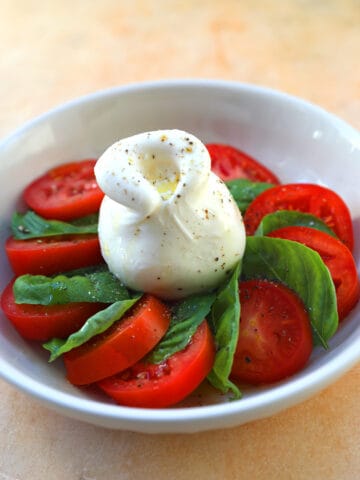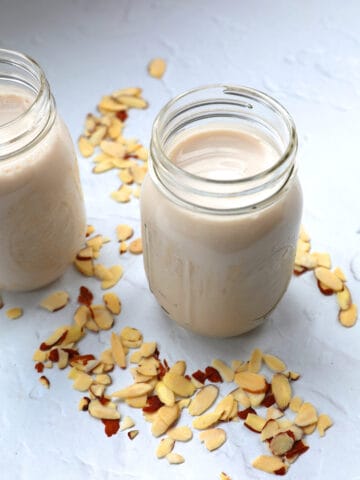Couscous is a popular North African dish that can go with a variety of foods, thanks to its ability to work well with a wide range of other flavors. But can you freeze couscous without affecting its taste or texture?

Trying to decide on what to serve with dinner isn’t always easy. Our family now uses a weekly dinner chart that we plan in advance so we can avoid last minutes (and lengthy!) debates on what sort of side dish we should make on any given night.
And recently, we’ve begun to add couscous to the rotation more often. It’s a great dish that you can pair with all sorts of meats, vegetables, and fresh herbs, and it’s easy to make.
But what if you end up making too much couscous? Can you freeze it to save for later?
The good news is that you can freeze cooked couscous. It should keep for up to 3 months in the freezer if stored properly.
Read on to discover how to freeze leftover couscous the right way so it stays fresher for longer.
Jump to:
What is Couscous?

Some might mistake couscous for a grain, but it’s actually a type of pasta – made from small balls of semolina flour mixed with water. This unique food originates from North Africa and comes in three main varieties: Moroccan, Israeli (or Pearl couscous), and Lebanese (Moghrabieh).
Moroccan is the smallest variation and takes just a few minutes to prepare in boiling water. Lebanese couscous is the largest in size.
It’s often seen as an ideal complement to all kinds of foods as it has a neutral flavor. So not only does it not compete with other, more pronounced tastes, it also has the ability to take on other flavors and add harmony to a dish.
For this reason, meats, roasted vegetables, and fruits are often added to couscous to make it more hearty and richer in flavor.
How to freeze couscous
Freezing cooked couscous is fairly simple. And the same method works regardless of the type of couscous you prepare. You just need to follow a few basic steps.
Here’s the best way to do it:
- After you cook the couscous, make sure it cools completely to room temperature. This will help prevent excess moisture from escaping from the couscous and clumping during the freezing process. And you’ll get more even reheating later on.
- If you’ve added foods to your couscous like meats or veggies, separate them out as they will freeze differently and can affect how long the couscous can keep.
- Then place a sheet of parchment on a baking sheet or baking tray and distribute the couscous evenly over it. This will help prevent the couscous from sticking to the sheet.
- Next, use plastic wrap or cling film to cover the baking sheet and flash freeze it for a couple of hours.
- Once it’s thoroughly frozen, you can separate the couscous sheet into smaller pieces and place them in freezer bags or in an airtight container to store long-term in the freezer. This will help prevent freezer burn.
It’s a good idea to label the bags with the date you froze them so you have an idea of when the couscous may be nearing its freezer shelf life.
How to reheat frozen couscous
Once you’re ready to reheat your frozen couscous, you’ll want to make sure you do it without sacrificing taste or texture. After all, no one likes mushy couscous! There are a couple of different methods you can use.
Using the stovetop
The best way to reheat frozen couscous is on the stovetop. This will help ensure it doesn’t heat up too quickly or unevenly.
- Grab a small saucepan and add some olive oil or butter and warm it up over low to medium heat.
- Add the frozen couscous from your freezer bag (no need to thaw it out first, you can add the frozen couscous directly to the saucepan)
- Add 1-2 tablespoons of cold water or chicken broth and begin to mix it in to the couscous as it gradually warms up.
- Once the water or broth is fully absorbed and the couscous has been reheated, use a fork to remove any clumps and create a fluffy texture. Season to taste. That’s it!
Using the microwave
You can also use the microwave to reheat frozen couscous. This method may be slightly quicker than using the stovetop, but you lose some control over how your couscous reheats.
Here’s how to do it:
- Grab your microwave-safe bowl of choice and add your frozen couscous to it.
- Add a few tablespoons of water to help moisten the couscous and aid in the reheating process. As the water evaporates, the steam from it will help make the couscous more fluffy.
- Depending on how much couscous you have, start by heating it for 30 seconds. Keep heating it at 30-second intervals until it’s warm throughout. Be careful not to overheat it as that can dry it out.
How long can you store dry couscous?
If you need to store uncooked couscous for a long time, the best environment to keep it in is in a cool, dry, dark place like a pantry. Like other dried pastas, it will keep for several months if stored properly.

FAQ
No, you don’t need to rinse couscous prior to cooking it. Couscous is a type of pasta, not a starchy grain. So you don’t need to wash it with water first, like you do with rice.
Generally, if the liquid you cooked couscous in is fully absorbed and the couscous is fluffy and tender, it is done. If it still has a crunchy texture, it needs to cook for a bit longer.
The bottom line
So, can you freeze cooked couscous leftovers for later use? Yes, you absolutely can! For best results, just make sure to let it cool completely, then place it in a sealed container with a date label on it. The couscous should keep for up to 3 months.
The freezing method outlined above works for Moroccan couscous, Israeli couscous, and Lebanese couscous.
More food storage answers
Get more answers to your food-related questions with the links below.






Leave a Reply